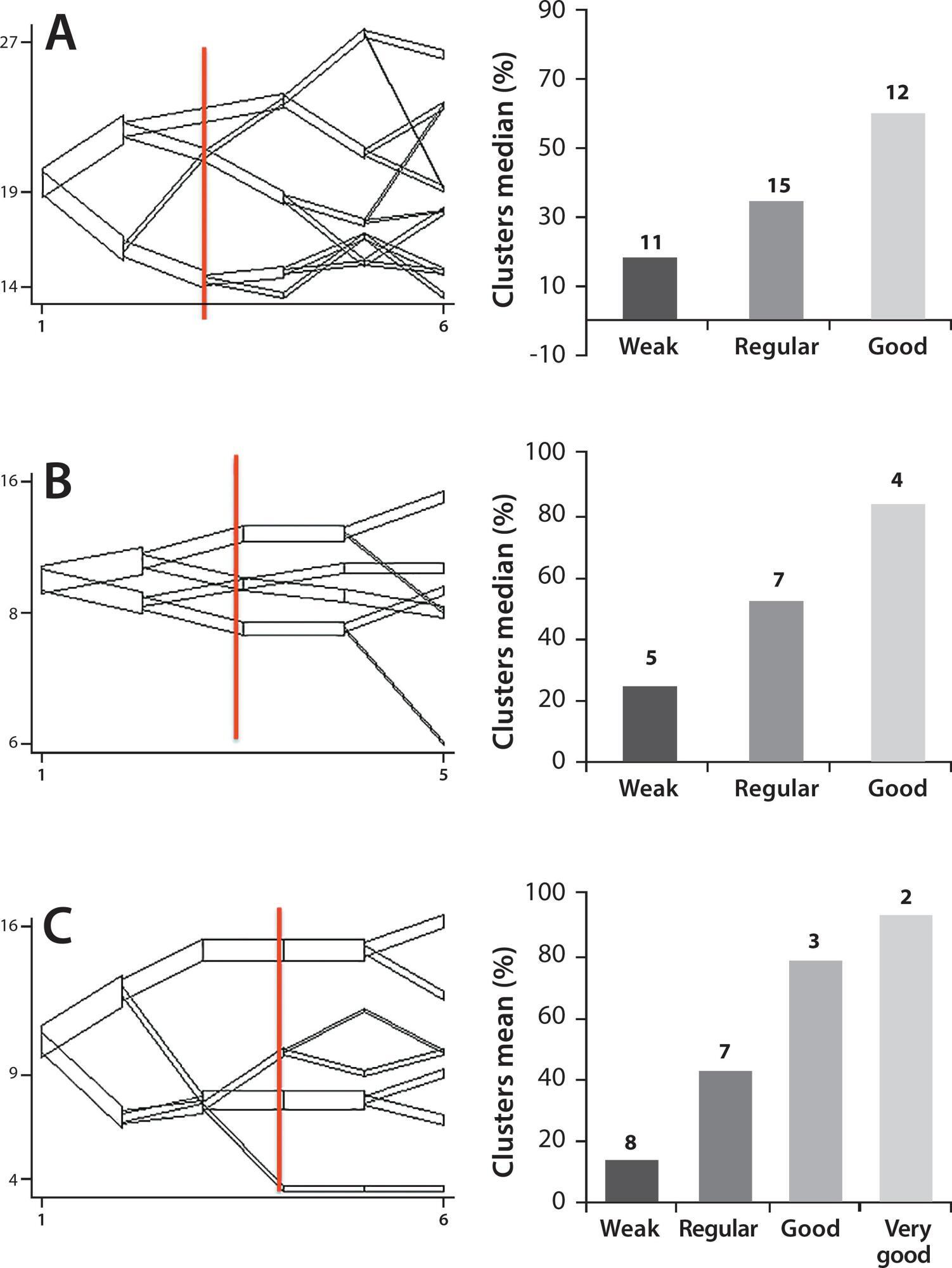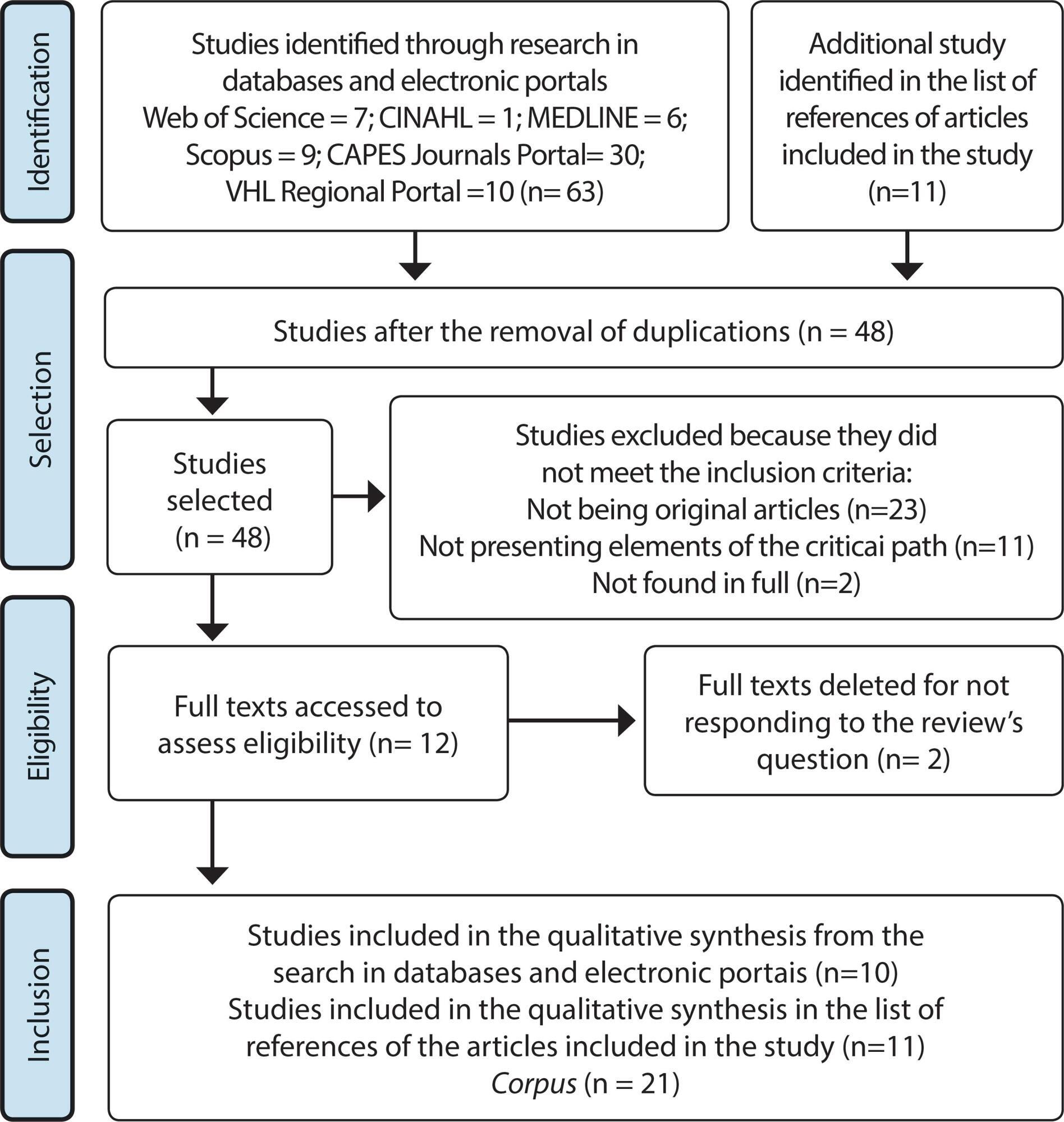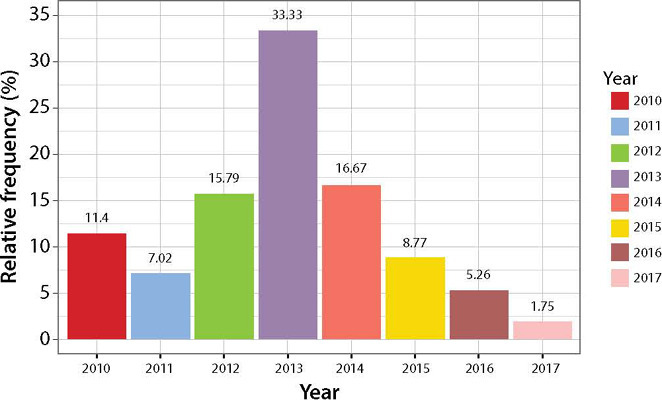-
RESEARCH01-01-2017
Mental health in the Family Health Strategy as perceived by health professionals
Revista Brasileira de Enfermagem. 2017;70(5):935-941
Abstract
RESEARCHMental health in the Family Health Strategy as perceived by health professionals
Revista Brasileira de Enfermagem. 2017;70(5):935-941
DOI 10.1590/0034-7167-2016-0492
Views0See moreABSTRACT
Objective:
to analyze the management of mental health needs in primary care as perceived by Family Health Strategy professionals.
Method:
this was a qualitative descriptive exploratory study developed within the coverage area of five family health teams. The data were collected using observation, group interviews, individual semi-structured interviews, and focus groups. Content analysis was conducted using text analysis software and interpretation was based on the corresponding analytical structures.
Results:
numerous and challenging mental health demands occur in this setting, for which the teams identified care resources; however, they also indicated difficulties, especially related to the operationalization and integration of such resources.
Conclusion:
there is a need for a care network sensitive to mental health demands that are better coordinated and more effectively managed.

-
RESEARCH01-01-2017
Nursing care by telehealth: what is the influence of distance on communication?
Revista Brasileira de Enfermagem. 2017;70(5):928-934
Abstract
RESEARCHNursing care by telehealth: what is the influence of distance on communication?
Revista Brasileira de Enfermagem. 2017;70(5):928-934
DOI 10.1590/0034-7167-2016-0142
Views0See moreABSTRACT
Objective:
Evaluate the perception of nurses regarding interpersonal communication while providing care via telehealth.
Method:
Qualitative research realized with seven nurses working in telehealth in Brazil, the sample was determined by data saturation. A questionnaire with open questions was applied and then content analysis of the dialogues was conducted, focusing on thematic analysis.
Results:
Four categories emerged from the dialogues: Understanding the importance of communication; the interpersonal relationship interfering with communication; Communicating via technology; and Learning the communication process.
Final considerations:
The perception of nurses working in telehealth in Brazil is that technology has facilitated their professional practice; however, in relation to the communication process, they believe it is harder to communicate by telehealth, mainly due to difficulty in perceiving nonverbal signals. To overcome these difficulties, they agreed that interpersonal communication is a skill that must be acquired during their professional training.
-
RESEARCH01-01-2017
Experiences in the Family Health Strategy: demands and vulnerabilities in the territory
Revista Brasileira de Enfermagem. 2017;70(5):920-927
Abstract
RESEARCHExperiences in the Family Health Strategy: demands and vulnerabilities in the territory
Revista Brasileira de Enfermagem. 2017;70(5):920-927
DOI 10.1590/0034-7167-2015-0033
Views0See moreABSTRACT
Objective:
To understand the daily demands of Family Health Strategy in clinical practice of the team and social vulnerabilities of community territory.
Method:
Research with qualitative approach, in a critical-reflexive perspective, held with two teams of the Family Health Strategy, in the city of Fortaleza, State of Ceará, Brazil. The participants were 22 users and 19 health professionals from the basic health network. Data from the interviews and observation were analyzed under the assumptions of critical hermeneutics.
Results:
We highlight the unveiling of sufferings and daily clashes, the influence of social determinants on health and psychosocial demands, limits and possibilities of everyday clinical practice.
Conclusion:
The clinic attention must recognize the perceptions and living conditions by listening and promoting health in the community.
-
RESEARCH01-01-2017
Neoliberalist influences on nursing hospital work process and organization
Revista Brasileira de Enfermagem. 2017;70(5):912-919
Abstract
RESEARCHNeoliberalist influences on nursing hospital work process and organization
Revista Brasileira de Enfermagem. 2017;70(5):912-919
DOI 10.1590/0034-7167-2016-0092
Views0See moreABSTRACT
Objectives:
To describe and analyze the influence of the neoliberal economic and political model on the nursing hospital work process and organization.
Method:
Qualitative descriptive research, having as its scenery a university hospital. The subjects were 34 nursing workers. The data collection took place from March to July 2013, through semi-structured interview. The data treatment technique used was content analysis, which brought up the following category: working conditions precariousness and its consequences to the hospital work process and organization in the neoliberal context.
Results:
The consequences of neoliberalism on hospital work process and organization were highlighted, being observed physical structure, human resources and material inadequacies that harms the assistance quality. In addition to wage decrease that cause the need of second jobs and work overload.
Final considerations:
There is a significant influence of the neoliberal model on hospital work, resulting on working conditions precariousness.
-
RESEARCH01-01-2017
Nursing team’s conceptions about the families of hospitalized children
Revista Brasileira de Enfermagem. 2017;70(5):904-911
Abstract
RESEARCHNursing team’s conceptions about the families of hospitalized children
Revista Brasileira de Enfermagem. 2017;70(5):904-911
DOI 10.1590/0034-7167-2016-0233
Views0See moreABSTRACT
Objectives:
to describe nursing team care and discuss the nursing team’s conception of companion families of hospitalized children. The study was based on the theoretical framework of Collière’s theory of nursing care identity.
Method:
this was a qualitative study with 14 members of a nursing team, conducted through an unstructured group interview. Thematic data analysis was employed.
Results:
habitual and repair care was delegated to families, regardless of the child’s clinical condition.
Final considerations:
the team’s official discourse about the families of hospitalized children, as recommended by the literature, refers to the family’s alterity and participation in care provision, with sights on discharge and defending family participation as beneficial to children. In practice, however, the nursing staff makes concessions about the presence of chaperoning families and delegates care.
-
RESEARCH01-01-2017
Innovation in nursing health care practice: expansion of access in primary health care
Revista Brasileira de Enfermagem. 2017;70(5):898-903
Abstract
RESEARCHInnovation in nursing health care practice: expansion of access in primary health care
Revista Brasileira de Enfermagem. 2017;70(5):898-903
DOI 10.1590/0034-7167-2016-0131
Views0See moreABSTRACT
Objective:
analyze the reorganization of the health care practice of nurses as an innovative strategy for expansion of access in primary care.
Method:
qualitative and quantitative study, which interviewed 32 management and care nurses and collected documentary data from public reports of production of nursing consultations from 2010 to 2014, in a municipality in southern Brazil. Data processing for textual analysis was performed by IRAMUTEQ software; for simple descriptive statistical analysis, the program Excel 2013 was used.
Results:
in the innovative care practice class, associated with awareness of change, related to implementation of the FHS, its challenges and advantages, the following subclasses were identified: reorganization of schedules, nursing consultation, physical restructuring of BHUs, and shared consultation.
Final considerations:
the need to expand access to and valorization of care practice encourages the development of innovative strategies. The protagonism of care needs to be discussed in the various spaces so that each professional carry out the respective role with competence and efficacy.

-
01-01-2017
The Nursing work and the construction of a democratic society
Revista Brasileira de Enfermagem. 2017;70(5):896-897
Abstract
The Nursing work and the construction of a democratic society
Revista Brasileira de Enfermagem. 2017;70(5):896-897
DOI 10.1590/0034-7167.2017700501
Views0In Brazil, the Nursing work is performed by an expressive contingent of workers, which – according to the last survey by the Brazilian Nursing Association – comprised 1,856,683 professionals, mostly women, distributed into three professional categories: Nurses, Nursing Technicians and Nursing Assistants, who work in public and private health care networks. With salaries lower than […]See more -
01-01-2017
O trabalho em Enfermagem e a construção de uma sociedade democrática
Revista Brasileira de Enfermagem. 2017;70(5):896-897
Abstract
O trabalho em Enfermagem e a construção de uma sociedade democrática
Revista Brasileira de Enfermagem. 2017;70(5):896-897
DOI 10.1590/0034-7167.2017700501
Views0No Brasil, o trabalho em enfermagem é realizado por expressivo contingente de trabalhadores, que, de acordo com o último levantamento realizado pela Associação Brasileira de Enfermagem, somava 1.856.683 profissionais, em sua maioria mulheres, distribuído em três categorias profissionais: Enfermeiros, Técnicos e Auxiliares de Enfermagem que atuam na rede pública e privada de saúde. Com baixos […]See more
-
ORIGINAL ARTICLE04-22-2020
Care coordination and longitudinality in primary health care in the Brazilian Amazon
Revista Brasileira de Enfermagem. 2020;73(3):e20180841
Abstract
ORIGINAL ARTICLECare coordination and longitudinality in primary health care in the Brazilian Amazon
Revista Brasileira de Enfermagem. 2020;73(3):e20180841
DOI 10.1590/0034-7167-2018-0841
Views0See moreABSTRACT
Objectives:
to evaluate the attributes of primary health care, care coordination and longitudinality, from the perception of the professional and patients in the state of Amazonas, Brazil.
Methods:
quantitative evaluative study, in which was used an external evaluation instrument with 469 professionals and 1,888 patients from 367 primary health care facilities that adhered to the Program for Improving Access and Quality of primary health care (Portuguese acronym: PMAQ) standardized by the Ministry of Health. Data were grouped by multivariate cluster analysis in order to find a classification of primary health care from the perspective of professionals and patients.
Results:
the attributes of coordination and longitudinality are still expressed in a weak and undeveloped way in the Brazilian Amazon scenario.
Conclusions:
it is necessary to recognize the organizational barriers and what could promote conditions for the performance of health care teams in the perspective of a continuous, integral and coordinated care.

-
ORIGINAL ARTICLE07-31-2020
Social and obstetric inequalities and vaccination in pregnant women
Revista Brasileira de Enfermagem. 2020;73:e20190099
Abstract
ORIGINAL ARTICLESocial and obstetric inequalities and vaccination in pregnant women
Revista Brasileira de Enfermagem. 2020;73:e20190099
DOI 10.1590/0034-7167-2019-0099
Views0See moreABSTRACT
Objectives:
to analyze the association of socioeconomic level and obstetric characteristics with vaccine registration of pregnant women.
Methods:
cross-sectional study, performed with 480 women in puerperal. Vaccination of pregnant women was considered a dependent variable and as independent variables were age, skin color, education, steady union, paid work, and number of prenatal consultations. Association between variables was verified by the Poisson’s regression model.
Results:
from 480 pregnant women’s health cards, 10.63% had information on hepatitis B vaccination; 31.46% for tetanus; and 90% of the health cards had not register for influenza. There was an association of paid work and number of prenatal consultations with hepatitis B vaccination.
Conclusions:
lower percentages in absence of vaccination occurred in women who were in the job market and had a higher number of prenatal consultations. This suggests that socioeconomic inequalities may interfere with the vaccination of pregnant women in health services.
-
ORIGINAL ARTICLE09-01-2021
Clinical Decision-Making in Nursing Scale (CDMNS-PT©) in nursing students: translation and validation
Revista Brasileira de Enfermagem. 2021;74:e20210032
Abstract
ORIGINAL ARTICLEClinical Decision-Making in Nursing Scale (CDMNS-PT©) in nursing students: translation and validation
Revista Brasileira de Enfermagem. 2021;74:e20210032
DOI 10.1590/0034-7167-2021-0032
Views0See moreABSTRACT
Objectives:
to validate, for the Portuguese population, the Clinical Decision-Making Nursing Scale© (CDMNS©).
Methods:
this methodological study involved 496 nursing students who filled in a questionnaire created using sociodemographic and academic data, and the scale to evaluate the making of decisions in nursing.
Results:
the confirmatory factorial analysis showed that the adjustment of the factorial structure has good quality, being made up by three factors (X2/gl = 2.056; GFI = 0.927; CFI = 0.917; RMSEA = 0.046; RMR = 0.039; SRMR = 0.050). For the scale to be reliable, it had to include only the reliability of the scale required it to be constituted by 23 items, with correlation values that varied from 0.184 and 0.610, and a global Cronbach’s Alpha of 0.851, which showed its good reliability.
Conclusions:
the CDMNS-PT© is valid and reliable, showing a high potential to be used in clinical practice and investigation.

-
EXPERIENCE REPORT02-25-2022
Production and use of educational technologies in nursing post-graduation
Revista Brasileira de Enfermagem. 2022;75(5):e20210510
Abstract
EXPERIENCE REPORTProduction and use of educational technologies in nursing post-graduation
Revista Brasileira de Enfermagem. 2022;75(5):e20210510
DOI 10.1590/0034-7167-2021-0510
Views0See moreABSTRACT
Objective:
To report, under the light of Gardner’s Theory of Multiple Intelligences, the experience of students with advanced educational practices, involving the production and use of technologies in the postgraduation nursing course of the Universidade Federal de Pernambuco.
Methods:
Experience report of students from the post-graduation nursing program from the Universidade Federal de Pernambuco, about the production of knowledge using educational technology and the application of active methodologies in the teaching-learning process for face-to-face and distance teaching.
Results:
The post-graduate students participated in the educational process in a creative way, both during in-person and distance teaching. They created: domino games, educational videos, parodies, conceptual maps, virtual role-playing, an interactive quiz, among others.
Final considerations:
The experience of the students with the advanced educational practices, including the production and use of technologies in nursing post-graduation showed that the teaching-learning process can be innovative and planned to go beyond traditional methods.
-
REVIEW12-13-2019
Critical path of women in situation of violence: an integrative literature review
Revista Brasileira de Enfermagem. 2019;72:321-332
Abstract
REVIEWCritical path of women in situation of violence: an integrative literature review
Revista Brasileira de Enfermagem. 2019;72:321-332
DOI 10.1590/0034-7167-2018-0265
Views1See moreABSTRACT
Objective:
To identify Brazilian and international scientific evidence on the critical path of women in situations of violence.
Method:
Integrative literature review developed in four databases and two electronic portals, in January 2017. Twenty-one full articles in English, Portuguese or Spanish from original researches were included in the time cut from 1994 to 2016, and which presented critical path elements, even without using this concept.
Results:
The critical path of women in situations of violence is constituted of elements related to their perceptions, actions and previous experiences regarding availability and quality of services, social representations of public servers and community and the results obtained in the search for help.
Conclusion:
Critical path elements are decisive for the women, and can promote, inhibit or delay the beginning of the route and consequently the end of situations of violence experienced by these women.

-
ORIGINAL ARTICLE07-01-2020
Obstetric analgesia in labor and its association with neonatal outcomes
Revista Brasileira de Enfermagem. 2020;73(5):e20180757
Abstract
ORIGINAL ARTICLEObstetric analgesia in labor and its association with neonatal outcomes
Revista Brasileira de Enfermagem. 2020;73(5):e20180757
DOI 10.1590/0034-7167-2018-0757
Views0See moreABSTRACT
Objetive:
To investigate the association between analgesia during labor and occurrence of neonatal outcomes.
Method:
Retrospective cohort study with medical records of 850 parturient. The exposure variable of interest was receiving pharmacological analgesia during labor and neonatal outcomes were: one- and five-minute Apgar, resuscitation maneuvers and referral of the newborn to Neonatal ICU. A logistic regression was carried out to obtain Odds Ratios and 95% confidence interval, with adjustment for confounding factors.
Results:
Among the women studied, 35% received analgesia and this use was associated with a greater chance of neonatal outcomes such as one-minute Apgar < 7 (p <0.0001), resuscitation maneuvers (p <0.001) and referral to the Neonatal ICU (p = 0.004), mostly were among low-risk pregnant women, even after adjustments.
Conclusion:
The use of pharmacological analgesia during labor is associated with one-minute Apgar < 7, resuscitation maneuvers and referral to the Neonatal ICU.
-
ORIGINAL ARTICLE12-13-2019
Nurses’ experiences in the care of high-risk newborns: a phenomenological study
Revista Brasileira de Enfermagem. 2019;72:111-117
Abstract
ORIGINAL ARTICLENurses’ experiences in the care of high-risk newborns: a phenomenological study
Revista Brasileira de Enfermagem. 2019;72:111-117
DOI 10.1590/0034-7167-2018-0221
Views0See moreABSTRACT
Objective:
To describe nurses’ experience in the care of high-risk newborns.
Method:
This is a descriptive study with a qualitative approach, based on Merleau-Ponty’s phenomenology and performed at the Fernando Magalhães Maternity Hospital in the state of Rio de Janeiro, through interviews with 30 nurses who work in neonatal care, according to the phenomenological thinking of Maurice Merleau- Ponty.
Results:
Three categories emerged: “experienced body of the nurse practitioner on the high-risk newborn”; “experienced world of the nurse practitioner on the high-risk newborn”; and “time spent by the nurse practitioner with the high-risk newborn”.
Final considerations:
The study allowed us to describe, through the participants’ speeches, that the care of the high-risk newborn is broad, that is, objective, subjective and carried out with advanced technologies, their experiences and scientific improvement are composed of shared practice and theory with the family, professionals and beginners in the neonatal universe, favoring a differentiated and humanized care.
-
ORIGINAL ARTICLE11-29-2022
Ethics in nursing: categorization of legal processes
Revista Brasileira de Enfermagem. 2022;75(3):e20210099
Abstract
ORIGINAL ARTICLEEthics in nursing: categorization of legal processes
Revista Brasileira de Enfermagem. 2022;75(3):e20210099
DOI 10.1590/0034-7167-2021-0099
Views0See moreABSTRACT
Objectives:
to categorize factual elements of ethical-disciplinary nursing lawsuits in the state of Goiás.
Methods:
cross-sectional, retrospective study, based on secondary data obtained from ethical-disciplinary lawsuits filed at the Regional Nursing Council of Goiás (Coren-Goiás) between the years 2010 and 2019.
Results:
the highest number of lawsuits filed was in 2013 and 2014, with a greater frequency in the state capital. The majority came from the Nursing Ethics Committees and ex-officio complaints. The professional with most complaints was the nursing technician, aged between 31 and 40 years old, at the beginning of their career. The most common type of complaints referred to performing attributions that were not within the nursing competences.
Conclusions:
as a highlight are the contributions of this study to professional ethics in nursing and the clear need to consolidate these skills in nurses who are in training and in the continuous education for those already in the profession.

Search
Search in:
Nuvem de Tags
Adolescente (85) Atenção Primária à Saúde (239) COVID-19 (91) Criança (91) Cuidados de Enfermagem (269) Educação em Enfermagem (151) Educação em Saúde (139) Enfermagem (930) Enfermagem Pediátrica (86) Estudantes de Enfermagem (77) Estudos de Validação (131) Família (87) Idoso (208) Promoção da Saúde (99) Qualidade de Vida (104) Saúde do Trabalhador (86) Saúde Mental (145) Saúde Pública (82) Segurança do Paciente (150) Tecnologia Educacional (100)



